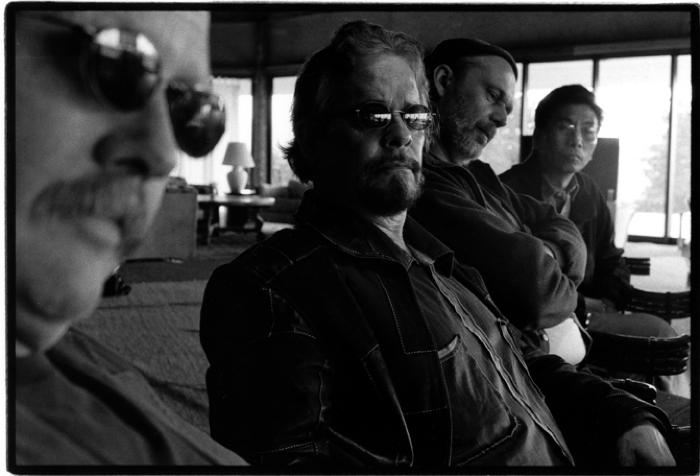Other Minds Festivals ➔ Stephen Scott, Daniel Lentz, Stephan Micus, and Ge Gan-ru, head and shoulders portrait, seated at table, heads turned to camera, Woodside CA, (2003)
Still image
Identifier
IM.OM.FP.0009.008Dates
2003-03-01/2003-03-31 | createdWork Type
Photographic printImage Class
Group PhotographsImage Series
OM09: Fago B&W PrintsDescription
Stephen Scott, Daniel Lentz, Stephan Micus, and Ge Gan-ru (l to r), during their retreat at the Djerassi Resident Artists Program in Woodside CA, prior to the 9th Other Minds Music Festival in March of 2003.Stephen Scott was born in Oregon in 1944 to parents trained in the sciences who were also talented amateur musicians. Early study of music included tutoring in recorder in Bristol, England, clarinet and
saxophone in elementary and secondary school bands, and private study and transcription of jazz recordings in high school. He studied composition at the University of Oregon with Homer Keller, and at Brown University with Gerald Shapiro and Paul Nelson, and traveled to Ghana, Tanzania, and Zimbabwe in 1970 to study African music. In Ghana, Scott met and studied informally with Steve Reich; later he collaborated with Terry Riley, and these two composers became his most significant influences outside jazz. Scott is professor of music at Colorado College. In 1977 Scott founded the Bowed Piano Ensemble, which has toured and broadcast widely in the United States, Europe and Australia.
In his student years at Brandeis University, Lentz was awarded a composition fellowship to work at Tanglewood in the summer of 1966. He spent 1967-68 abroad as a Fulbright Fellow in Electronic Music in Stockholm, Sweden. The following year Lentz accepted a visiting lectureship at the University of California at Santa Barbara. In 1970 he began devoting more of his time to composition and performance, founding and directing the California Time Machine, a conceptual music ensemble based in Santa Barbara. Upon moving to Los Angeles, Lentz founded and directed the Daniel Lentz Group. The DLG was especially prominent in its revolutionary use of "live multi-track recording" in its performances in the 1980s and early 1990s. Lentz's music from his years in Los Angeles is generally fast-paced and upbeat (like L.A. itself), as heard in pieces such as Talk Radio, Wild Turkeys and The Crack in the Bell. Since moving from Los Angeles to the Sonoran Desert in Arizona his music has undergone a major metamorphosis. Recent works, such as the Temple of Lament, Apologetica, A Tiger In The Garden, and The Insect reflect these changes, evoking the desert and involving the listener in their dark intensity.
Born in 1953 in Germany, Stephan Micus made his first journey to the Orient at the age of sixteen. Fascinated by the variety of musical cultures around the world, Micus has traveled in virtually every Asian and European country as well as in Africa and the Americas. Studying with local master musicians, he learned to play numerous traditional instruments, many of them unknown in the Western world. However, Micus's intention is not to play these instruments in a traditional manner, but rather to develop the fresh musical possibilities, which he feels are inherent in them. In many of his compositions, which he performs himself, he combines instruments that have never before been played together. The resulting dialogues further reflect his vision of a trans-cultural music. In addition to his exclusively acoustic instruments Micus also uses his voice, at times—with multitrack recording techniques—creating whole choral pieces by himself.
Ge Gan-ru, born in 1954 in Shanghai, has been called China’s first avant-garde composer. He received degrees in both violin and composition at the Shanghai Conservatory of Music, where he also served as Assistant Professor of Composition. In 1982, when China was still largely unfamiliar with 20th century Western music, he wrote a controversial piece called Yi feng for solo cello which used unorthodox extended techniques to produce timbres simulating Chinese percussive instruments. In 1983, he was awarded a fellowship to attend Columbia University where he studied with Chou Wen-chung and Mario Davidovsky.
Ge has composed music for theater, dance, and documentary and feature films as well as concert music. Ge’s music reflects his deep interest in amalgamating Eastern and Western musical aesthetics.
Genres & Subjects
Group portraits--2000-2010Men
Composers
Musicians
Image Ownership
John Fago / Other MindsPhoto Credits
John FagoRelated Event
Other Minds Festival 9Related place
Woodside (Calif.) (was created at)Related Entities
Fago, JohnScott, Stephen, 1944-2021
Lentz, Daniel, 1942-
Micus, Stephan
Ge, Gan-Ru, 1954-
Other Minds Festival
Djerassi Resident Artists Program
